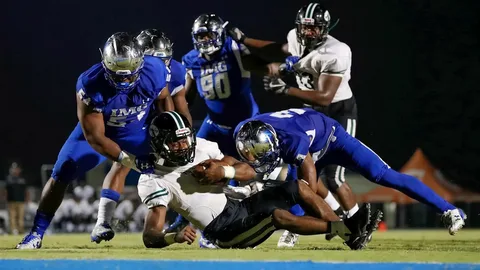College football is a demanding sport, requiring a balance of intense physical training, travel, games, and academic responsibilities. College football players often face the challenge of managing their time efficiently, as they juggle practices, workouts, class schedules, and the pressure to maintain academic performance. For athletes striving to succeed on the field and in the classroom, effective time management is essential.
Time management is more than just planning out a weekly schedule; it’s about making intentional choices to optimize your day, avoid burnout, and ensure you can perform your best both in the classroom and on the field. College football players must learn to manage their time wisely to balance their athletic and academic careers while maintaining a healthy social life and taking care of their mental well-being.
Time Management Challenges for College Football Players
Football players face numerous time constraints that make it difficult to manage both academics and athletics. On average, a college football player spends over 40 hours per week on football-related activities, including practices, meetings, travel, and games. These hours are in addition to the time spent on coursework and other commitments. The physical and mental demands of training can leave players exhausted, making it challenging to find time for studying, socializing, or simply resting.
The typical college football schedule often follows a grueling weekly routine, with early morning workouts, classes during the day, afternoon practices, and evening meetings or film sessions. Game day, which can involve travel, leaves little time for academics. For student-athletes who are passionate about both their sport and their studies, finding time for everything can seem overwhelming.
Developing a Practical Schedule: Football, Classes, Study Time, and Personal Life
Effective time management starts with creating a realistic schedule. While you may not be able to control every aspect of your day, you can prioritize tasks and make the most of the time you have. Here are some steps to help you build an efficient weekly schedule:
- Plan Ahead: Use a planner or a digital calendar to map out your schedule at the beginning of each week. Input all the fixed commitments, including class times, football practices, workouts, meetings, and game days. Having a visual representation of your schedule helps you avoid conflicts and ensures you stay organized.
- Prioritize Your Tasks: Once you have a rough outline of your schedule, break down the tasks for the week. Academic assignments, projects, and tests should be given priority based on deadlines. Football practice and training can be viewed as fixed commitments, but you’ll want to ensure you have enough time to complete your coursework and study for exams.
- Create Blocks of Time: Time blocking is a powerful strategy. Break your day into specific periods for particular tasks. For instance, designate certain hours of the day for classes, practice, meals, study time, and rest. Even short blocks of focused time can make a significant difference in staying on track.
- Use Downtime Wisely: Between classes or during travel time, make use of small pockets of free time to get ahead on reading, review notes, or even do light exercises or stretching. Maximizing every moment will help you avoid falling behind.
- Leave Time for Rest and Socializing: Football and academics are demanding, but so is maintaining a healthy social life and mental well-being. Schedule time for breaks, relaxation, and activities you enjoy. Rest is essential for both your physical recovery and mental sharpness. Social interactions provide the emotional support that is vital to staying balanced.
Tools and Apps to Help Stay Organized
In today’s digital world, there are numerous tools and apps designed to help athletes manage their time more efficiently. Many of these tools are free or low-cost and can provide a huge boost in organization. Some examples include:
- Google Calendar: Use it to block out your time, color-code activities, and set reminders for deadlines. You can access it on your phone, tablet, or computer, ensuring that your schedule is always accessible.
- Trello: A project management tool where you can create boards for different aspects of your life, such as academics, training, and personal tasks. Trello allows you to break down tasks into manageable pieces, making it easier to stay organized.
- Evernote: A note-taking app that lets you save lectures, ideas, and to-do lists in an organized manner. You can sync your notes across multiple devices, so they are always within reach.
- Forest: This app helps you stay focused by encouraging you to stay off your phone for a set period while you work. As you remain focused, a virtual tree grows, reinforcing positive habits and reducing distractions.
- Focus@Will: This app provides productivity-boosting music scientifically designed to improve concentration and reduce distractions while studying or working.
How to Avoid Burnout: Knowing When to Rest
One of the biggest challenges college football players face is avoiding burnout. It’s easy to get caught up in the cycle of constant activity—practices, workouts, classes, meetings, and games—until you feel mentally and physically drained. To avoid burnout:
- Listen to Your Body: Pay attention to signs of physical and mental fatigue, such as poor concentration, irritability, or lack of motivation. If you’re feeling exhausted, don’t hesitate to take a short break or get more sleep. Rest is critical for recovery.
- Take Active Breaks: Rest doesn’t just mean sitting still. Engage in low-impact activities such as stretching, walking, or yoga to help with recovery. These active breaks can help prevent stiffness and give your mind a much-needed break.
- Sleep Well: Aim for at least 7-9 hours of sleep per night. Sleep is essential for muscle recovery, cognitive function, and overall well-being. Prioritize sleep, even during busy times, to keep your performance at its best.
Key Advice from Successful College Football Athletes
Successful college football players often share similar habits when it comes to time management. Many emphasize the importance of staying disciplined with their schedules and not letting distractions interfere with their goals. Some tips from experienced players include:
- Consistency is Key: Develop a routine that works for you and stick to it. Successful athletes don’t leave things to chance. They stay disciplined and focus on their priorities every day.
- Seek Help When Needed: Don’t be afraid to reach out to coaches, academic advisors, or teammates for help when you need it. It’s important to build a support system that can help you manage your responsibilities effectively.
- Set Short-Term and Long-Term Goals: Successful athletes set both short-term goals (e.g., finishing homework early) and long-term goals (e.g., making the starting lineup). Setting goals gives you a sense of purpose and direction.
Conclusion: Prioritizing Both Football and Academics for Long-Term Success
In college football, success on the field and in the classroom requires careful planning and time management. By prioritizing your commitments, staying organized, and maintaining a healthy balance between school, football, and personal life, you can maximize your potential both academically and athletically. Effective time management is a skill that will not only help you succeed in college but will also serve you well in life after football, setting the foundation for a fulfilling and successful future.














Leave a Reply